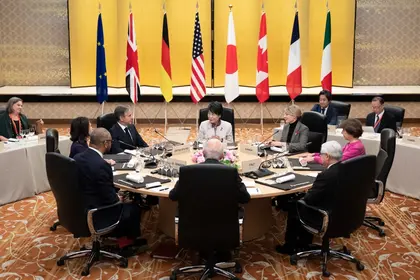G7 foreign ministers sought Wednesday, Nov. 8, to hammer out a common line on the Israel-Hamas war while vowing there would be no let-up in their support for Ukraine in its war with Russia.
The ministers were expected to issue a joint statement later in Tokyo calling for "humanitarian pauses" in Gaza, while stopping short of urging a ceasefire.
JOIN US ON TELEGRAM
Follow our coverage of the war on the @Kyivpost_official.
US Secretary of State Antony Blinken, arriving for the talks from his latest whirlwind Middle East tour, called Tuesday for the G7 to speak "in one clear voice" on the conflict.
Japanese Foreign Minister Yoko Kamiwaka said late Tuesday that the G7 ministers "need to call on the relevant countries to take humanitarian pauses and ensure humanitarian access, which is a pre-condition for sufficient and continued humanitarian assistance".
A diplomatic source said after a working dinner focusing on Gaza the same day that there was "great unity that in view of the humanitarian emergency in Gaza, humanitarian care for the Palestinian civilian population needs to be urgently expanded".
The source added that there were "constructive exchanges" about humanitarian pauses, as well as the need for discussions among the G7 and other countries in the region about the future of Gaza and how to stop the conflict from spreading.
- 'Overall security' -
The Israeli military has relentlessly bombarded Gaza since October 7, when Hamas militants launched an attack that left 1,400 dead in Israel, most of them civilians, according to Israeli authorities.

Luxury Western Goods Line Russian Stores, Three Years Into Sanctions
The Hamas-run health ministry says the death toll in Gaza has surpassed 10,300 people.
Prime Minister Benjamin Netanyahu said Monday there would be no fuel delivered to Gaza and no ceasefire unless more than 240 hostages seized by Hamas were freed.
He also said Israel would assume "overall security" in Gaza after the war ended, while allowing for possible "tactical pauses" before then to free captives and deliver aid to the besieged territory.
However, Washington said Tuesday it opposed a new long-term occupation of Gaza by Israel.
- Ukraine fatigue -
On the Ukraine war, Japan said Wednesday after talks that the G7 were "united" in their resolve to continue providing "strong support" to Kyiv and imposing "severe sanctions" on Russia.
Kamikawa added that "even as tensions increase in the Middle East, it is important for the G7 to be united in sending a clear message to the international community that our steadfast commitment to supporting Ukraine will never waver".
With the war there now in its 20th month and Ukraine's counteroffensive struggling to gain ground, President Volodymyr Zelensky has regularly met Western leaders to try to stave off fatigue over the conflict.
German Foreign Minister Annalena Baerbock said earlier that G7 countries were working on providing help to Ukraine as the country braced for a second full winter of Russian attacks on energy facilities.
Similar strikes by Moscow's forces last year left thousands without heating or electricity in freezing temperatures.
"It is clear, particularly at this moment, that around the world some (parties) are watching very closely how we will continue to support Ukraine," Baerbock told reporters.
"We will do that with everything we are doing."
Ukrainian Foreign Minister Dmytro Kuleba was set to join the G7 meeting by video conference.
- North Korea -
Japan also said that the G7 ministers had "strongly condemned North Korea's repeated ballistic missile launches as well as arms transfers from North Korea to Russia, which directly violate relevant UN Security Council resolutions".
North Korea has provided Russia with over one million artillery rounds to use in Ukraine, with Pyongyang appearing to receive advice on satellite technology in return, a South Korean lawmaker said earlier this month, citing Seoul's spy agency.
The countries' leaders, Kim Jong Un and Vladimir Putin, held a summit in September in Russia's far east, with the United States subsequently saying Pyongyang had begun providing Moscow with weapons.
The Kremlin said last month there was "no proof" North Korea was sending it weapons.
The G7 meetings also discussed how best to engage with an increasingly assertive China, with ministers recognising the importance of "expressing our concerns directly" to Beijing while also working with it "on global challenges as well as areas of common interest", Japan said.
You can also highlight the text and press Ctrl + Enter






